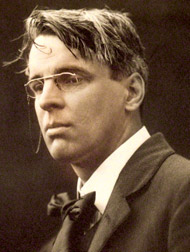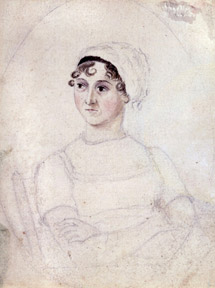A poet’s question, a novelist’s answer
‘But I have that within which passes show’:
 Lady Augusta Gregory, widow of a former Governor of Ceylon, was the
patron of the Irish literary revival in which WB Yeats played a leading
role. He wrote the poem ‘To Anne Gregory’ for her: Lady Augusta Gregory, widow of a former Governor of Ceylon, was the
patron of the Irish literary revival in which WB Yeats played a leading
role. He wrote the poem ‘To Anne Gregory’ for her:
“Never shall a young man,
Thrown into despair
 |
|
W B Yeats |
By those great honey-coloured
Ramparts at your ear,
Love you for yourself alone
And not your yellow hair”.
“But I shall get a hair-dye
And set such colour there,
Brown, or black, or carrot,
That young men in despair
May love me for myself alone
And not my yellow hair.”
“I heard an old religious man
But yesternight declare
That he had found a text to prove
That only God, my dear,
Could love you for yourself alone,
And not your yellow hair.”
The poem raises an interesting question. Can a woman be loved by a
man for herself rather than for her looks? This poem implies that a
woman's looks are the primary attraction for a man, but a better-known
poem, ‘When You Are Old’, suggests otherwise. It is about the love of
Yeats’ life, Maud Gonne. He bids her remember, when she is “old and grey
and full of dreams”, that while “many loved your moments of glad grace,
And loved your beauty with love false or true...one man loved the
pilgrim soul in you, And loved the sorrows of your changing face.”
The poet here professes a love superior to other men's in that it is
‘the pilgrim soul’ in the beloved that he values. Since it is ‘for
herself alone’ that he loves her, therefore, his love will ‘not alter
when it alteration finds’ as her looks decline with age.
Yet Yeats may have spoken too soon. For, years later, in ‘Among
School Children’, it is indeed with regret that he contemplates the
changes that age has wrought in Maud Gonne's appearance:
“Her present image floats into my mind...Hollow of cheek as though it
drank the wind And took a mess of shadows for its meat.”
In turn, this disenchantment with her appearance seems to have been
prompted by a deeper disenchantment, witness this further reference to
her in ‘A Prayer for My Daughter':
“Have I not seen the loveliest woman born
Out of the mouth of
 |
|
Jane Austen |
Plenty's horn,
Because of her opinionated mind
Barter that horn and every good
By quiet natures understood
For an old bellows full of angry wind?”
Clearly, the pilgrim soul in her did not live up to expectation.
Ultimately she proved to be unlovable ‘for herself alone’ even by her
most ardent admirer.
So what are we to conclude? That even the exceptional man that loves
a woman for herself rather than for her looks is bound to be
disappointed? That, in the words of Donne, it is “some lovely glorious
nothing” that he will find in her in the end? And that we must concur
with his cynical conclusion:
“Hope not for minde in women;
at their best Sweetnesse and wit,
they are but Mummy, possest.”?
For answer we must turn from a great poet to a great novelist; from
WB Yeats to Jane Austen.
‘Pride and Prejudice’ is all about the personality of Elizabeth
Bennet. She is lovable not for her looks which, if Darcy's first
impressions are to be believed, are not outstanding. “She is tolerable”,
he tells his friend, “But not handsome enough to tempt me.” Elizabeth's
chief attraction is ‘herself alone’, her vivacious nature, her brilliant
intelligence and her sparkling wit. Hers is an altogether vibrant
personality for which Darcy, notwithstanding his initial prejudice,
falls completely. Here, surely, is the answer to Anne Gregory's
aspiration, the evidence that a woman can be totally lovable for herself
alone!
Yet, after making us all fall totally in love ourselves with
Elizabeth's personality, Jane Austen makes us see that there is
something lacking about it. It is, after all, distorted by the pride and
the prejudice that have prevented her from appreciating Darcy's real
worth, just as his own pride and prejudice had excluded her from his
favourable consideration in the first instance. Developments in the
story cause Elizabeth to realise this herself, and when she does her
mortification is great indeed. She accuses herself of being “blind,
partial, prejudiced, absurd.” In her insistence on being ‘herself’ she
has failed to see herself as she really is.
“Till this moment I never knew myself.” And it is only when she
achieves such self-knowledge that she qualifies, in the way the story
eventuates, to achieve the happiness that her own all too attractive
personality had all but cost her.
What does all this show? What is Jane Austen telling us in this
novel? Quite simply, that for a woman to be truly lovable ‘for herself’
something more than personality, however charming, engaging and
captivating that personality may be, is required if such love is to
stand the test of time. What that ‘something more’ is Jane Austen has
implied by the end of Pride and Prejudice'. But she puts the matter
beyond all doubt in her next novel, ‘Mansfield Park.’
Fanny Price, the heroine - some might even call her the anti-heroine
- of ‘Mansfield Park’ seems to be the very opposite of Elizabeth Bennet.
If the latter's is a personality to which we are irresistibly drawn,
Fanny's is one from which we are inclined to withdraw. She is so timid,
modest and self-effacing as to appear dull and repressed.
Nevertheless Fanny not only is, she proves herself to be, the heroine
of the novel. Though she may have little to show for herself by way of
personality, she could well claim with Hamlet, “But I have that within
which passes show.” Jane Austen shows us through her portrayal of Fanny
Price that there is something of far greater value to cherish in oneself
and in another than personality, and that is character.
This is confirmed by the portrayal of Mary Crawford who seems almost
to be a recreation of Elizabeth Bennet. Hers is another such attractive,
lively and witty personality and Edmund, whom Fanny secretly loves, is
captivated by her. But as the novel progresses Mary is seen ultimately
to be superficial, insincere and manipulative. In fact, as Edmund
finally realises and tells Fanny, hers are serious faults because they
are “faults of principle”. In other words, Mary's engaging personality
exists side by side with grave deficiencies of character which
disqualify her from further romantic attention by Edmund.
Fanny Price is not an obvious beauty, whether in looks or in
personality. But we come to realise, as does Edmund, that she is
possessed of an inner beauty that comes from her depth of character. Her
sense of duty, her willingness to exert herself on behalf of others, her
fortitude and resignation in the face of adversity, her kindness and the
generosity of her spirit - all these are eventually revealed as sterling
qualities that make a difference to those around her and endow her with
a special attraction and value in their eyes.
They are what cause Edmund finally to fall in love with her, thereby
requiting the love she had entertained for him without hope for so many
years.
Thus, it has taken the insight of a great novelist to answer the
question prompted by a great poet. Is it possible to love a woman for
herself rather than for her looks - without, that is to say, being
disappointed, as the poet was? The evidence of both poetry and fiction
is that it is, provided one knows what to look for - character rather
than personality. Perhaps Yeats came to realise this himself, because in
his ‘Prayer for My Daughter’ he seems to be wishing something similar
for her:
“In courtesy I'd have her chiefly learned; Hearts are not had as a
gift but hearts are earned By those that are not entirely
beautiful.....May she become a flourishing hidden tree That all her
thoughts may like the linnet be, And have no business but dispensing
round Their magnanimities of sound.”
|



